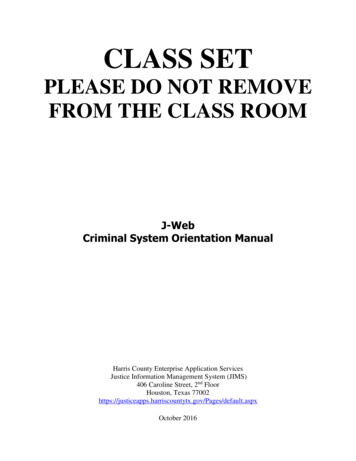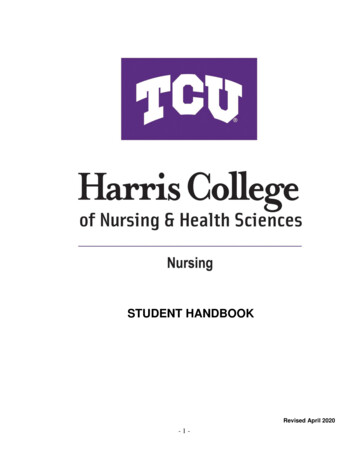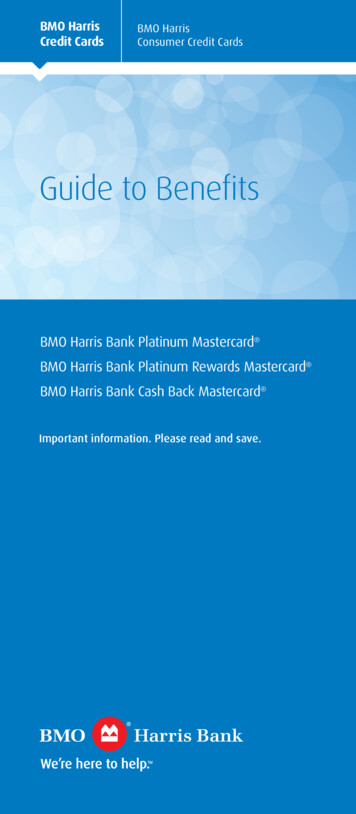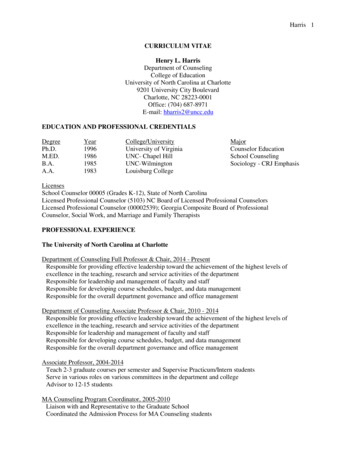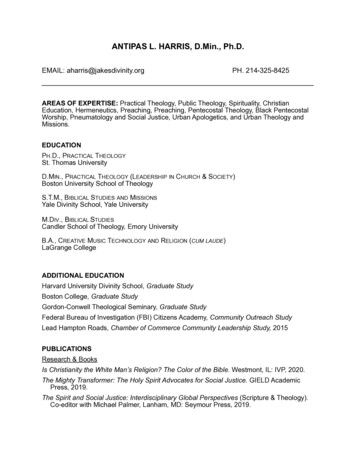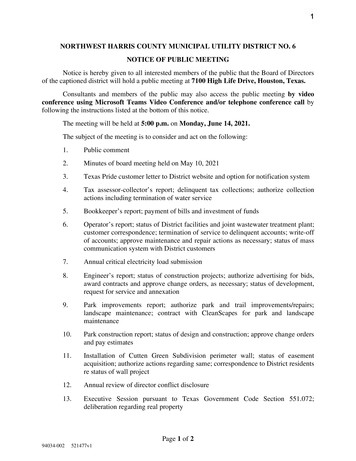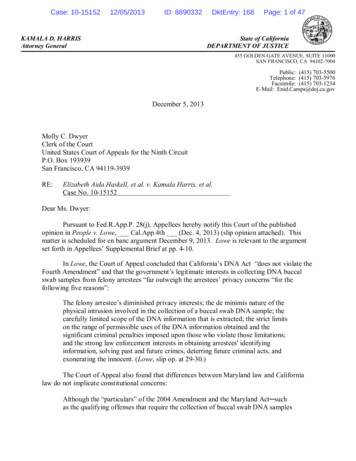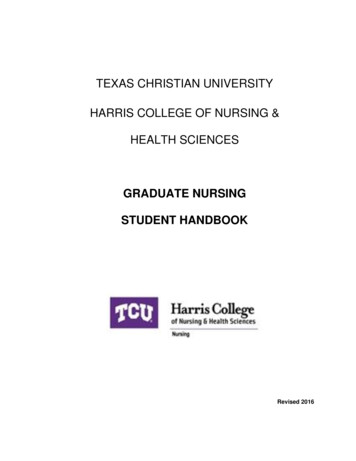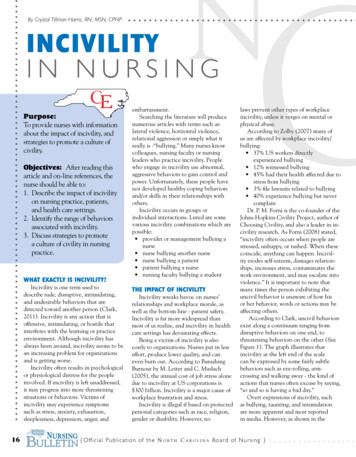
Transcription
By Crystal Tillman Harris, RN, MSN, CPNPINCIVILITYI N N U RS I N GPurpose:To provide nurses with informationabout the impact of incivility, andstrategies to promote a culture ofcivility.Objectives: After reading thisarticle and on-line references, thenurse should be able to:1. Describe the impact of incivilityon nursing practice, patients,and health care settings.2. Identify the range of behaviorsassociated with incivility.3. Discuss strategies to promotea culture of civility in nursingpractice.WHAT EXACTLY IS INCIVILITY?Incivility is one term used todescribe rude, disruptive, intimidating,and undesirable behaviors that aredirected toward another person (Clark,2011). Incivility is any action that isoffensive, intimidating, or hostile thatinterferes with the learning or practiceenvironment. Although incivility hasalways been around, incivility seems to bean increasing problem for organizationsand is getting worse.Incivility often results in psychologicalor physiological distress for the peopleinvolved. If incivility is left unaddressed,it may progress into more threateningsituations or behaviors. Victims ofincivility may experience symptomssuch as stress, anxiety, exhaustion,sleeplessness, depression, anger, and16Nursing { OfficialulletinBembarrassment.Searching the literature will producenumerous articles with terms such as:lateral violence, horizontal violence,relational aggression or simply what itreally is -“bullying.” Many nurses knowcolleagues, nursing faculty or nursingleaders who practice incivility. Peoplewho engage in incivility use abnormal,aggressive behaviors to gain control andpower. Unfortunately, these people havenot developed healthy coping behaviorsand/or skills in their relationships withothers.Incivility occurs in groups orindividual interactions. Listed are somevarious incivility combinations which arepossible: provider or management bullying anurse nurse bullying another nurse nurse bullying a patient patient bullying a nurse nursing faculty bullying a studentTHE IMPACT OF INCIVILITYIncivility wreaks havoc on nurses’relationships and workplace morale, aswell as the bottom line - patient safety.Incivility is far more widespread thanmost of us realize, and incivility in healthcare settings has devastating effects.Being a victim of incivility is alsocostly to organizations. Nurses put in lesseffort, produce lower quality, and caneven burn out. According to BanishingBurnout by M. Leiter and C. Maslach(2005), the annual cost of job stress alonedue to incivility at US corporations is 300 billion. Incivility is a major cause ofworkplace frustration and stress.Incivility is illegal if based on protectedpersonal categories such as race, religion,gender or disability. However, nolaws prevent other types of workplaceincivility, unless it verges on mental orphysical abuse.According to Zolby (2007) many ofus are affected by workplace incivility/bullying: 37% US workers directlyexperienced bullying 12% witnessed bullying 45% had their health affected due tostress from bullying 3% file lawsuits related to bullying 40% experience bullying but nevercomplainDr. P. M. Forni is the co-founder of theJohns Hopkins Civility Project, author ofChoosing Civility, and also a leader in incivility research. As Forni (2008) stated,“incivility often occurs when people arestressed, unhappy, or rushed. When thesecoincide, anything can happen. Incivility erodes self-esteem, damages relationships, increases stress, contaminates thework environment, and may escalate intoviolence.” It is important to note thatmany times the person exhibiting theuncivil behavior is unaware of how hisor her behavior, words or actions may beaffecting others.According to Clark, uncivil behaviorsexist along a continuum ranging fromdisruptive behaviors on one end, tothreatening behaviors on the other (SeeFigure 1). The graph illustrates thatincivility at the left end of the scalecan be expressed by some fairly subtlebehaviors such as eye-rolling, armcrossing and walking away - the kind ofactions that nurses often excuse by saying,“so and so is having a bad day.”Overt expressions of incivility, suchas bullying, taunting, and intimidationare more apparent and most reportedin media. However, as shown in thePublication of the N o r t h C a r o l i n a Board of Nursing } . . . . . . . . . . . . . . . . . .
NCContinuum of Incivility graphic, this canbegin in what appears to be a relativelybenign manner, with behaviors suchas sarcastic comments or dominatingconversation in a group. It is essentialto any organization to recognizethe behaviors at the left end of thecontinuum, to name them, and ultimatelyaddress them to prevent more aggressiveacts of anger or violence from occurring.During the NC Board of Nursing 2011Education Summit, Dr. Cindy Clarkstated, “Bullying is allowed to occur for3 reasons: because it can; because it ismodeled; because it is left unchecked.”WHAT DOES INCIVILITY LOOK LIKE?As Clark stated in the incivilitycontinuum, there are a range of uncivilbehaviors. Dellasega (2009) came up withcommon uncivil behaviors which include: using the “silent treatment” spreading rumors rude or obnoxious behavior badgering or back-stabbing sabotaging a project damaging someone’s reputation using humiliation, put-downs, andintimidation failing to support a co-worker setting up someone for failure undermining of work verbal abuse public reprimandsDistracting,annoying,irritatingbehaviors sarcasm destroying confidence losing one’s temper or yelling atsomeone continual criticism encouraging others to turn against aco-workerThe effects of incivility take a tollon all of us. It erodes our self-esteemby wearing down our mental defenses.When we feel vulnerable, there is anincrease in anxiety, which can lead toresentment and anger. It also damagesour relationships by causing feelings offailure, isolation and loss. It also increasesstress, which weakens the immune system,causes wear and tear on the body, spiritand soul. Even worse the effects can leadto depression and post-traumatic stressdisorder (PTSD). It also contaminatesthe workplace by lowering morale,organizational trust and job satisfaction.Nurse leaders can be in a difficultsituation too. For nurses in a leadershiprole, to remain silent is to condonethe behavior. If leadership accepts thebehavior, it makes it harder for othersto report the same type of behavior.The nurse may feel his or her leadershipapproves of the behavior. When in reality,leadership may not realize incivility isoccurring. The behavior needs to bebrought to the nurse leader’s attentionfor further action. Do not assume theContinuum of IncivilityLow RiskAggressive,potentiallyviolentbehaviorsHigh RiskDisruptive BehaviorsThreatening BehaviorsBehaviors range from:eye-rolling sarcastic comments bullying taunting racial/ethnic slurs intimidation physical violenceClark 2009, revised 2011Figure 1. Continuum of incivility. Published with permission from Cynthia Clark.behavior has probably been reported byanother nurse.Incivility also occurs with student nursesby nurses in practice and nursing faculty.It results in students having decreasedconfidence, anger, frustration, sleeplessness,anxiety, stress and worry. When studentnurses are subjected to bullying by nursesin practice, they are more apt to emulatethe behaviors and engage in bullyingactivities themselves. Modeling of expectedprofessional behaviors is the responsibility ofeach nurse.NURSING PROFESSIONALISMThe Essentials of BaccalaureateEducation for Professional NursingPractice (2008) states that inherent inprofessionalism is accountability andresponsibility for individual actions andbehaviors, including civility. Civility mustbe present for professionalism to occur.The American Nurses Association(ANA) Nursing Code of Ethics (2001)states the nurse at all times maintainsstandards of personal conduct whichreflect well on the profession and enhancepublic confidence. Provision 1.5 requiresnurses to treat colleagues, students, andpatients with dignity and respect and thatany form of harassment, disrespect, orthreatening action will not be tolerated.The Joint Commission takes theposition that incivility is a safety issue,and issued a standard on intimidatingand disruptive behaviors at work. TheJoint Commission cited concerns aboutincreased medical errors, poor patientsatisfaction, adverse outcomes, highercosts, and loss of qualified staff. The JointCommission Sentinel Event Alert (July,2008) states that health care is a “highstakes, pressure-packed environmentthat can test the limits of civility in theworkplace.” The rude, disruptive behavioramong health care professionals can posea serious threat to patient safety and theoverall quality of care. All health caresettings need to create behavioral codes ofconduct and establish a formal process formanaging unacceptable behavior.continued on page 18 . . . . . . . . . . . . . . . . . . . . . . . . . . . . . . . . . . . . . . . . . . . . . . . . . . . . . . . . . . . . . . . . . . . . . 17
continued from page 17HOW TO DEAL WITH INCIVILITYSo let us take a time-out and learnhow to deal with incivility at anindividual and organizational level.INDIVIDUAL LEVELIt is always best if you can cometo a resolution between you and theperson exhibiting incivility. Start outby describing how the behavior makesyou feel. Sometimes dealing directlywith the person might not be an option.Take a time out and walk away from thesituation whenever you cannot discussthe behavior and come to a resolution.An objective third party may need to beinvolved. Don’t try to speak and defendyourself unless you feel it is absolutelynecessary. Doing so may encourage theincivility. The bully is looking for youto add fuel to the fire - do not give himor her satisfaction. Practice some slowrelaxation breathing and put things intoperspective. If worries start to build up,do not hesitate in seeking professionalcounseling. Many workplaces haveemployee assistance programs availableto you.Role modeling and showing greatpassion for the nursing profession isimportant, as well as mentoring othernurses. Colleagues disagree with eachother at times, but it is important tomaintain respect for each other. Respectis basic to communicating with otherson a daily basis. Experienced nursescan model how to confront othersin a positive, constructive manner.Remember, none of us start out tobecome marginal or mediocre nurses.We work very hard to become highlyproficient and expert nurses (Clark,2010).Incivility can be difficult to determinefrom the small, subtle acts that manypeople experience. Sometimes we evenquestion ourselves. Is our perceptioncorrect of the other person’s behavior?Incivility can take us off guard, becausewe simply are not expecting the behaviorto occur. Little things such as showingup late to meetings, texting or checkingemails during meetings, dismissing or18Nursing .ulletinBignoring co-workers concerns, thoughtsor input are all examples of more subtletypes of incivility.If you find you are becoming thetarget of incivility, then it is importantto document when each incident occurs.Write down the date and time of theincident, along with the details of theinteraction. Continue doing this untilyou see a pattern emerge. A singleincident may not get attention, buta pattern of behavior will have to beaddressed. Consider copying any letters,memos or emails that have a bullying orrude tone to them. As nurses we knowthe importance of documentation.Set up a meeting with a humanresources representative or someonewho is higher in the organization thanthe uncivil person. Only do this afteryou have established a documentedpattern of behavior. Ask people whohave witnessed the behavior to stand upfor you. If they agree, give their namesto your nurse leader or human resourcesrepresentative, along with the evidenceyou have collected. There is power innumbers and those not directly involvedoffer an objective perspective.ORGANIZATIONAL LEVELUsually “bullies” never recognize theirown behavior as being uncivil. Theymay leave one position, only to wreakhavoc someplace else. Their perceptiontruly becomes their reality. Incivility canbecome the norm for a workplace, whichmakes it harder to change. Dealingwith the behavior in a timely manner,will prevent incivility from becomingthe norm. Once incivility is allowed tobecome the norm, it takes time to getthe workplace back to a positive, healthyenvironment. Most experts agree thatit takes 2-5 years for an organization tochange its culture.Policies are a must to prevent and/or improve incivility. A code of conductis necessary to describe the behaviorsthat are considered disruptive. Thecode needs to address all employeesin an organization such as nurses, andnonemployees such as providers. In orderfor a code of conduct to be effective, itmust be applied in all circumstances.Leadership needs to be not onlyinvolved in the process, but committedto modeling civility and reinforcing itsimportance. Without this enforcement,. . . . . . . . . . . . . . . . . . . . . . . . . . . . . . . . . . . . . . . . . . . . . . . . . . . . . . . .
NCthe code is useless. All team members,including leadership, need to beaccountable for modeling and enforcingthe code of conduct.Equally important is addressingincidents and complaints in a timelymanner, and taking corrective actionso employees see it is not condoned ortolerated. Nurse leaders need to set thetone and expectations for the type ofprofessional interactions that will occurin the workplace. Words can be typedin a mission statement, but the truth isthat nurses and students will model thebehaviors they observe and experiencefrom their nurse leaders and faculty.If my nurse leader does not “walk thetalk,” I am going to ignore the rules anddo what I know I can get away with.We all drift occasionally and that ishuman nature. However as nurses, weare ultimately accountable for our ownprofessional behaviors.Education is the key to helpingothers. Some health care settings areseeking to educate nurses on how toimprove social interactions, enactproper business etiquette, and fosterpositive people skills in the workplaceenvironment. Some people may notrealize they exhibit uncivil behavior.Many people believe this is “not aboutme.” Many times people lack insight orself-awareness, and have no idea how tochange behavior that may be ingrained.Educating everyone on the new policieswill help create an open, friendly andaccepting environment. It may benecessary to provide coaching andmentoring as needed to help improvethe behaviors of others.There should be a zero tolerancefor incivility. It is important for all ofus to teach civility and educate othersto recognize and respond to incivility.Nurse leaders must take complaintsseriously and not shoot the messenger. Ittakes great courage to report incivility.Do not make excuses such as “that is justthe way she is, but you will get used toit” or “the unit cannot afford to lose himeven though he creates tension on theunit.” As a nurse leader it is importantto gather data quickly, sort out the facts,and take action when necessary. It is alsoimportant to conduct post-departureinterviews, not at the time an employeeleaves, but several weeks after leaving.This will give you a better picture asto what other factors may have beeninvolved in the employee leaving his orher position.It is important to sustain thenew culture by encouraging opencommunication so that civilitybecomes the norm. Nurse leaders needto guide responsibly and create a safeenvironment so nurses are not fearfulwhen sharing concerns or reportingincidents. Nurse leaders also need topromote constructive and open feedbackso nurses learn how to demonstraterespect and common courtesy. It isimportant to be accepting of each other’sideas and opinions.Nursing education programs needto include incivility topics in thecurriculum. It is also helpful to havestudents role play various situations. Ithas been found that new graduates areable to handle uncivil behaviors in amore appropriate manner, with the useof role play.WRAPPING IT ALL UPKupperschmidt (2006) talks aboutthe term care-fronting in nursing.It is when nurses care enough aboutthemselves and their patients toconfront uncivil behavior face-to-faceimmediately, directly, and respectfullyto foster mutual respect. One questionwe should all ask ourselves: What ifnurses respected ourselves as much as werespect our patients? It is up to each oneof us to take care of ourselves and others.As Forni stated, “encouraging civilityin the workplace is becoming one ofthe fundamental corporate goals in ourdiverse, hurried, stressed and litigationprone society.” A civil workplace isgood for health care providers, since ourquality of life is improved in such anenvironment. But a civil workplace is alsogood for the patients, since the quality ofcare they receive from happier and morerelaxed health care providers is improved.Our shared goal should be thecreation of a safe, respectful placefor nurses to practice. Nurses can beambassadors and leaders for change.With more than 3 million nurses inthe US, no other licensed healthcareprofession has the potential power thatnurses hold as a group. It is importantfor us to agree upon and unite behindcommon expectations for how we aretreated and how we treat others we have the ability to change ourworkplace.As Dr. Clark stated at the NC Boardof Nursing 2011 Education Summit“Choosing civility is important and theright thing to do.”REFLECTION QUESTIONSScenario #1:You are a new graduate nursepracticing on a medical unit. There is acolleague that has been on the unit forseven years. One day after orientationyou hear her grumbling that “you needto pick up your pace; you are not pullingyour weight.” How might you handlethis situation?A direct approach is to acknowledgethe offensive behavior head-on withoutoffering excuses or opinions. You mightsay, “You criticize me a lot about mypace, and it distracts me from caring formy patients. I want you to stop makingthese comments so that I can focus onmy patients.” Confrontation can bechallenging, but it often puts an end tothe problem by directly addressing theoffensive behavior.Scenario #2:You are sitting with several othercolleagues catching-up on charting forthe day. One of your colleagues startsgossiping and slamming another one ofyour colleagues. How might you handlethis situation?If someone is gossiping and slammingyour colleague, do not join in or giveapproval by saying nothing. Have thecourage to say, “I do not feel righttalking about this behind his or hercontinued on page 20 . . . . . . . . . . . . . . . . . . . . . . . . . . . . . . . . . . . . . . . . . . . . . . . . . . . . . . . . . . . . . . . . . . .19
NC continued from page 19back. Have you talked with him orher?” It is important to hold each otheraccountable for our chosen behaviors.Scenario #3:You just came out of a patient’s room,when suddenly you hear a providerscreaming and yelling at one of yourcolleagues. How might you handle thissituation?If you see someone being bullied,do not stand by quietly or pretend youdo not see it. Unless each nurse namesuncivil behavior when it occurs, itcontinues without any consequences.The behavior exhibited by the provideris unprofessional, and should not betolerated. One hospital uses a “codeincivility” for each unit. When one ofyour colleagues is being bullied by anotherperson, the rest of the nurses come andstand by the nurse being bullied, withoutsaying a word. This action is usuallyenough to stop the behavior of the uncivilperson, and draws attention to theirinappropriate behavior.Time for reflection:Remember a time when you have beenbullied by a nursing faculty member, peeror someone in leadership. How did the situation make you feel? Did you experience any of the listedfeelings stated in the article? How did you resolve the situation? Was it an assertive approach or didyou le
By Crystal Tillman Harris, RN, MSN, CPNP WHAT EXACTLY IS INCIVILITY? Incivility is one term used to describe rude, disruptive, intimidating, and undesirable behaviors that are directed toward another person (Clark, 2011). Incivility is any action that is offensive, intimidating, or hostile that interferes with the learning or practice environment.


